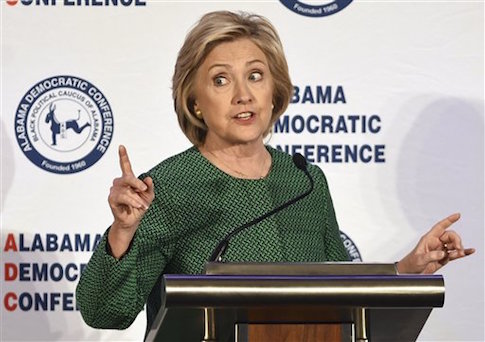[h=2]National Archives Hit With Lawsuit Over Clinton Emails[/h]Citizens United asking for more info about public records review process
SHARE
TWEET
EMAIL

BY: Alana Goodman
October 21, 2015 10:30 am
A conservative group is suing the National Archives to turn over details about its review process of Hillary Clinton’s emails, according to a lawsuit filed on Wednesday.
The National Archives reviewed 1,246 Clinton emails last spring that State Department officials had previously determined were “personal” and should be withheld from the public. The Archives said last May that it agreed with State’s assessment that none of the messages were related to official business.
However, Citizens United, a nonprofit filmmaking group, has been pressing the National Archives for more information on its review process. The organization filed a lawsuit on Wednesday, after the agency failed to respond to a public records request submitted in June.
Citizens United has requested “any and all correspondence, schedules, memoranda, attendee lists, and any other records related to the planning, attendance, and methodology” used during the review.
“This is a narrow [Freedom of Information Act] request, so it shouldn’t be taking months and months to get documents,” said David Bossie, president of Citizens United. “The American people have a right to inspect these records in a timely fashion, that’s why Citizens United filed suit today.”
Citizens United has several other lawsuits pending against the State Department for records related to Clinton’s time as secretary of state, including one filed on Monday for information about her schedule.
This is the second time this week the National Archives has been sued to turn over Clinton-related records. The conservative watchdog group Judicial Watch asked the D.C. District Court on Tuesday to compel the National Archives to release documents from the independent counsel’s office under Bill Clinton.
Judicial Watch requested records from the National Archives last March related to a draft indictment of Hillary Clinton allegedly written by Deputy Independent Counsel Hickman Ewing, Jr.
The agency said in May it had found responsive documents in files marked “Draft Indictment,” and “Hilary Rodham Clinton/Webster L. Hubbell Draft Indictment.” However, the Archives declined to turn them over under a privacy exemption for certain law enforcement information.
According to Judicial Watch, the indictments “reportedly arose out of the Office of Independent Counsel investigation into Mrs. Clinton’s involvement in an allegedly fraudulent transaction, Castle Grande, involving the assets of Madison Guaranty Savings & Loan.”
The group said the records are in the public interest and should be released.
“Judicial Watch has confirmed the existence of draft indictments of Hillary Clinton for her lies and obstruction in the Whitewater bank fraud investigation,” said Judicial Watch president Tom Fitton in a statement on Tuesday. “The Obama administration is refusing to release these records out of concern for Hillary Clinton’s privacy. Hillary Clinton’s privacy cannot be allowed to trump the public’s interest in knowing more about whether she obstructed justice and lied to a federal grand jury.”
SHARE
TWEET
AP
BY: Alana Goodman
October 21, 2015 10:30 am
A conservative group is suing the National Archives to turn over details about its review process of Hillary Clinton’s emails, according to a lawsuit filed on Wednesday.
The National Archives reviewed 1,246 Clinton emails last spring that State Department officials had previously determined were “personal” and should be withheld from the public. The Archives said last May that it agreed with State’s assessment that none of the messages were related to official business.
However, Citizens United, a nonprofit filmmaking group, has been pressing the National Archives for more information on its review process. The organization filed a lawsuit on Wednesday, after the agency failed to respond to a public records request submitted in June.
Citizens United has requested “any and all correspondence, schedules, memoranda, attendee lists, and any other records related to the planning, attendance, and methodology” used during the review.
“This is a narrow [Freedom of Information Act] request, so it shouldn’t be taking months and months to get documents,” said David Bossie, president of Citizens United. “The American people have a right to inspect these records in a timely fashion, that’s why Citizens United filed suit today.”
Citizens United has several other lawsuits pending against the State Department for records related to Clinton’s time as secretary of state, including one filed on Monday for information about her schedule.
This is the second time this week the National Archives has been sued to turn over Clinton-related records. The conservative watchdog group Judicial Watch asked the D.C. District Court on Tuesday to compel the National Archives to release documents from the independent counsel’s office under Bill Clinton.
Judicial Watch requested records from the National Archives last March related to a draft indictment of Hillary Clinton allegedly written by Deputy Independent Counsel Hickman Ewing, Jr.
The agency said in May it had found responsive documents in files marked “Draft Indictment,” and “Hilary Rodham Clinton/Webster L. Hubbell Draft Indictment.” However, the Archives declined to turn them over under a privacy exemption for certain law enforcement information.
According to Judicial Watch, the indictments “reportedly arose out of the Office of Independent Counsel investigation into Mrs. Clinton’s involvement in an allegedly fraudulent transaction, Castle Grande, involving the assets of Madison Guaranty Savings & Loan.”
The group said the records are in the public interest and should be released.
“Judicial Watch has confirmed the existence of draft indictments of Hillary Clinton for her lies and obstruction in the Whitewater bank fraud investigation,” said Judicial Watch president Tom Fitton in a statement on Tuesday. “The Obama administration is refusing to release these records out of concern for Hillary Clinton’s privacy. Hillary Clinton’s privacy cannot be allowed to trump the public’s interest in knowing more about whether she obstructed justice and lied to a federal grand jury.”
 ointer:
ointer:




